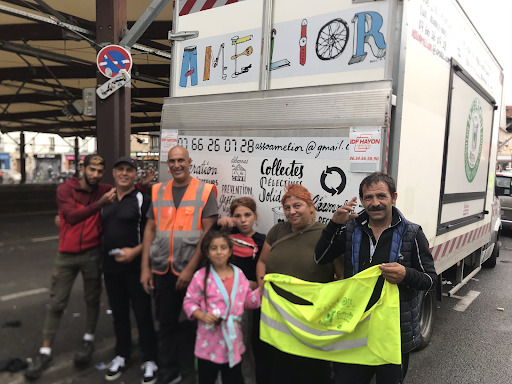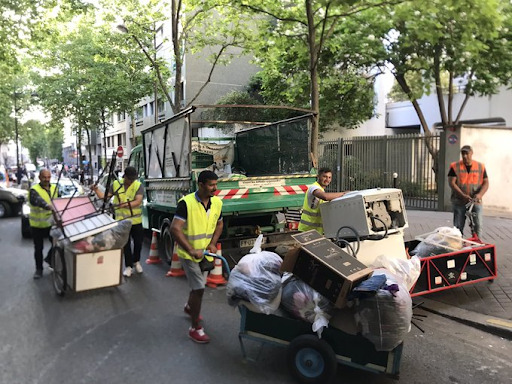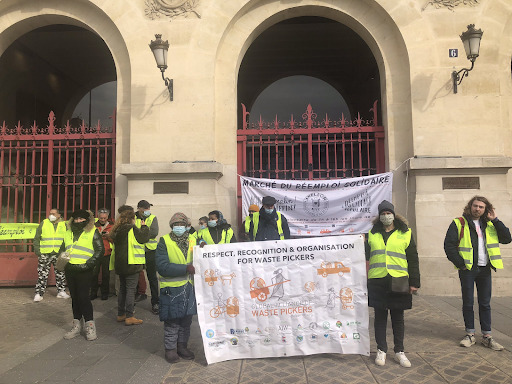Subscribe to our E-Letter!
Subscribe to our e-mail and stay up-to-date with news and resources from street vendors around the world.
The most recent StreetNet affiliate is Association Amélior, which is based in France. Amélior was founded in 2012, with this year marking its tenth year of existence. It has been founded to represent and defend the rights of street vendors and waste pickers and recyclers in the country. Currently it has around 700 members, mainly active in the area of Paris, where Amelior is based.
We had the opportunity to welcome Amelior and chat with its director and founder, Samuel Le Coeur.
“We have decided to join StreetNet” tells us Samuel “to have a better understanding and knowledge of the techniques and best practices regarding organizational aspects and to foster cooperation. The more we are, the better we can organize advocacy work.” At the moment, Amelior has a well structured team, with ten people working as employees and around fifty members joining regularly for the weekly meetings. The organization is also part of The Global Alliance of Waste Pickers (Globalrec), an historic partner and ally of StreetNet.

Amelior represents those that in France are known as biffins, independent sellers of second-hand objects and goods, which may come from personal property, waste sorting or private exchange. In France, this profession has been recognised for a long time, since the thirteenth century, and the flea markets where the biffins work have been granted an official status in 1910. The job is an old one, traditionally taught from “parent to child”. Despite the long standing history of the biffin profession, the workers are often the target of repression, legal and police harassment. Amélior fights for the rights of the biffins and stands in favor of a thriving local economy based on recycling and encourages the organizing of the workers. To do so, it organizes communal markets and grants spaces for the biffins in already existing markets. It issues a card for its members that allows them to connect and trade with other members. Moreover, it offers the permanence of a social assistance, proposing a social follow-up of the biffins and their families, as well as an institutional mediation. Amelior also organizes social activities for its affiliates and offers them the opportunity to get in touch with each other.
Amelior organizes small second hand markets around the area of Paris, where recyclers and street vendors can conduct their business. They provide work for around 300 second-hand market workers in the Ile-de-France region, who are often in a very precarious situation. Each market contributes to the recycling of 5 tons of goods and merchandise, which go back into the consumption cycle, not only having a significant impact on the lives of the people, but also on the sustainability of the line of production and the local economy.
Samuel explains the challenges and battles that he and his team are facing. “There are many people selling in the markets now, and most of them want to carry on their activity legally” he says. “We are constantly working to find new job opportunities for our members.” There are, however, political and administrative obstacles. One of them, sadly not uncommon for organized street vendors and informal economy workers, is policy brutality and repression. “We constantly face waves of police brutality – there is a clear lack of respect for our rights.”

Amelior has repeatedly tried to present public bids to the Paris municipality to manage markets and spaces for its members. “We keep losing against bigger associations who have better ties with the authorities,” explains Samuel. “Nonetheless we present projects that are more in line with the workers’ needs. We are now waiting for the response to a public bid from the new administration”
“In France, working in the social sector is significantly easier through public funding”, adds Samuel “In order to implement our project, we are forced to respond to public bids. However, the systems hardly work in favour of the ones we represent. The calls are not tailored to the needs of vendors, recyclers and waste pickers. The authorities are not aware of our situations, our struggles, our precarity.”
Gentrification and the rise in property prices also play a role. “The spontaneous, unorganized markets of independent salvagers are a loss of income for property owners and developers, and the flea markets of salvagers are also disappearing in Paris for these reasons.”
Despite the lack of cooperation from the state entities, Amelior keeps organizing meetings and gatherings for its members. You can consult some of the events on their Facebook page. At the moment they are trying to present projects also in Marseille, another major French city. The activities keep going and slowly and steadily, Amélior continues its fight for the rights of informal economy workers.
Finally, we asked Samuel what advice he would give to young people who are willing to start organising their communities.
“Listen to the others, be patient and resist!” He says “There will be difficulties, so resistance is key. Surround yourself with people you trust. Also, it is important to foster solidarity, both at the local level and at the international level”.


By entering your personal data and clicking “Suscribe,” you agree that this form will be processed in accordance with our privacy policy. If you checked one of the boxes above, you also agree to receive updates from the StreetNet International about our work